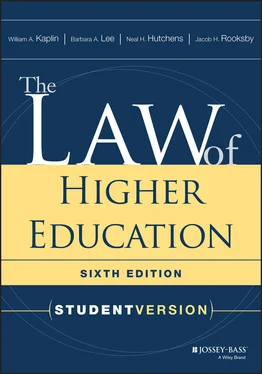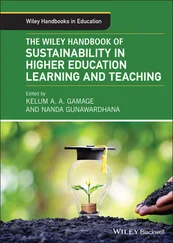The court held that the PEC was the agent of the university and that the director of athletics, “as an officer of the corporate agent [PEC], had the implied power and authority to bind the principal—Wichita State University.” The court further held that failure to obtain the board of regents' approval did not invalidate the contract because the legislature had “delegated to the board of regents the authority to control, operate, manage, and supervise the universities and colleges of this state” (540 P.2d at 76), 6 and the board had created no policy, rule, or regulation that limited the authority of its agents to enter into contracts. The fact that the agreement had been partly performed was particularly persuasive to the court.
For a later example of a case in which a court ruled that the individual signing a contract on behalf of the Arizona Board of Regents lacked the authority to modify a contract, making the contract modification unenforceable, see Kaman Aerospace Corp. v. Arizona Board of Regents , 171 P.3d 599 (Ariz. Ct. App. August 23, 2007).
In a case involving both apparent authority and ratification doctrines, the Supreme Court of Massachusetts ruled that Boston University had to pay a technical training company more than $5.7 million for its “willful and knowing” breach of contract ( Linkage Corporation v. Trustees of Boston University , 679 N.E.2d 191 (Mass. 1997), cert. denied , 522 U.S. 1015 (1997)). One important issue in the case was whether an earlier contract between Boston University and Linkage for the provision of educational services by Linkage had been renewed; Linkage asserted that it had, but the university stated that the contract had not been renewed but had been lawfully terminated. A jury had found that the university's vice president for external programs had apparent authority to enter a renewal contract with Linkage and also found that the university had ratified that agreement.
With respect to the apparent authority issue, the court noted that the vice president had “virtual autonomy” in supervising the relationship between Linkage and the university. He had been the university's representative in the negotiation of the earlier contract and was named in the contractual documents as the university's primary representative for all legal notices. Boston University argued that the vice president lacked authority to enter the agreement because, at the same time that negotiations for the contract renewal were taking place, the university had issued a directive that required all payments greater than $5,000 to be authorized by the senior vice president. The court, however, ruled that, because the vice president for external programs had direct access to the president and because the contractual relationship predated the directive, it was reasonable for Linkage's president to conclude that the directive would not be enforced with respect to its contract with the university.
With respect to the ratification issue, the court agreed with the jury that the conduct of university officials subsequent to the execution of the renewal contract supported the ratification argument. The vice president had asked his superiors, in writing, if additional review was necessary after he executed the renewal contract. Neither the senior vice president nor the president advised Linkage's president or their own vice president that they did not approve of the renewal contract. Characterizing the conduct of university officials as “informed acquiescence,” the court endorsed the jury's finding that the university had ratified the agreement. Although the behavior of university officials was sufficient to establish ratification, the court added that, because the university benefited financially from the execution of the renewal contract, this benefit was additional evidence of its ratification of the agreement.
Colleges and universities are increasingly being sued for breach of contract by current or former employees. These issues are discussed in Chapter 4of this book. Even colleges controlled by religious organizations may be subject to breach of contract claims. For example, the Supreme Court of New Jersey ruled, in McKelvy v. Diocese of Camden , 800 A.2d 840 (N.J. 2002), that a former seminarian could sue the Diocese of Camden, New Jersey, for breach of contract. The plaintiff alleged that he had been sexually harassed while a student at the seminary; he sued for reimbursement of his tuition and loans, and for compensatory damages. Despite the argument by the diocese that such a lawsuit violated the First Amendment's free exercise clause, the state court ruled unanimously that the case could proceed.
Although students attempting to assert claims for educational malpractice are finding their tort claims dismissed, their contract claims sometimes survive summary judgment or dismissal, as long as the contract claim is not an attempt to state a claim for educational malpractice. See Metcalf v. University of North Carolina at Chapel Hill , 798 S.E.2d 442 (N.C. Ct. App. 2017) (upholding finding that trial court lacked subject matter jurisdiction where plaintiffs reframed what were actually educational malpractice claims—which are not recognized in North Carolina—as claims of breach of contract, breach of fiduciary duty, fraud, and unfair and deceptive trade practices).
For example, in Swartley v. Hoffner , 734 A.2d 915 (Pa. Super. Ct. 1999), appeal denied , 747 A.2d 902 (Pa. 1999), a doctoral student who was denied a degree brought a breach of contract claim against Lehigh University and her dissertation committee members, claiming that they had failed to carry out their duties as required by university policies. The court ruled that “the relationship between a private educational institution and an enrolled student is contractual in nature; therefore, a student can bring a cause of action against said institution for breach of contract where the institution ignores or violates portions of the written contract” (734 A.2d at 919). But the court nevertheless affirmed the trial court's award of summary judgment to the defendants, finding no evidence that university policies required dissertation committee members to give the student a passing grade once her dissertation defense had been scheduled. But not all courts will allow breach of contract claims to proceed in these circumstances. In Gally v. Columbia University , 22 F. Supp. 2d 199 (S.D.N.Y. 1998), a trial judge dismissed the student's contract claim, ruling that it was a disguised attempt to state a claim for educational malpractice.
The variety of contract and agency law principles that may bear on contract liability makes the area a complex one, calling for frequent involvement of legal counsel. The postsecondary institution's main concern in managing liability should be the delineation of the contracting authority of each of its agents. By carefully defining such authority and by repudiating any unauthorized contracts of which they become aware, postsecondary administrators can protect the institution from unwanted liability. Although protection may also be found in other defenses to contract actions, such as sovereign immunity, advance planning of authority is the surest way to limit contract liability and the fairest to the parties with whom the institution's agents may deal.
Section 3.4. Institutional Liability for Violating Federal Constitutional Rights (Section 1983 Liability)
3.4.1 Overview.The tort and contract liabilities of postsecondary institutions discussed above are based in state law and, for the most part, are relatively well settled. The institution's federal constitutional rights liability, in contrast, is primarily a matter of federal law, which has undergone a complex evolutionary development. The key statute governing the enforcement of constitutional rights, 7 commonly known as Section 1983 and codified at 42 U.S.C. § 1983, reads in pertinent part:
Читать дальше












